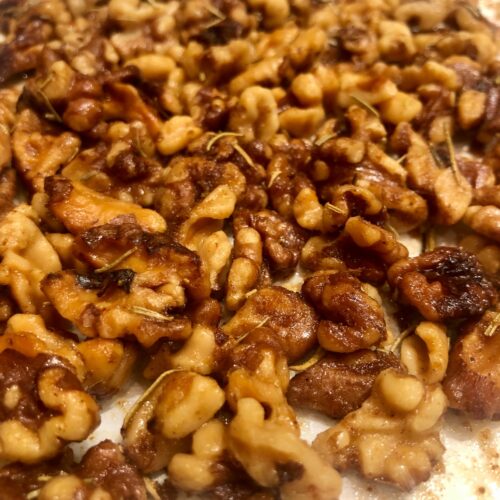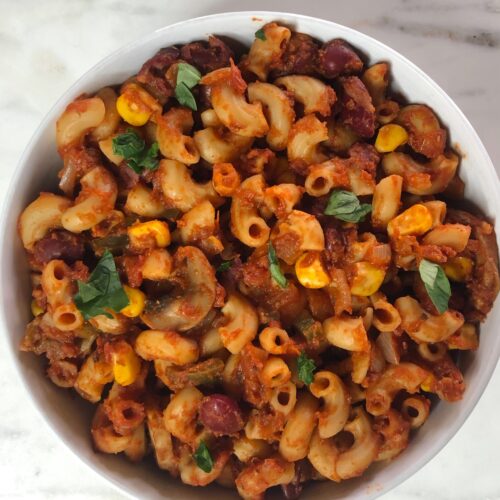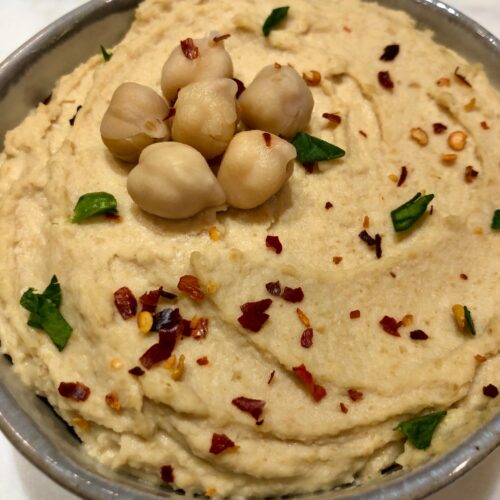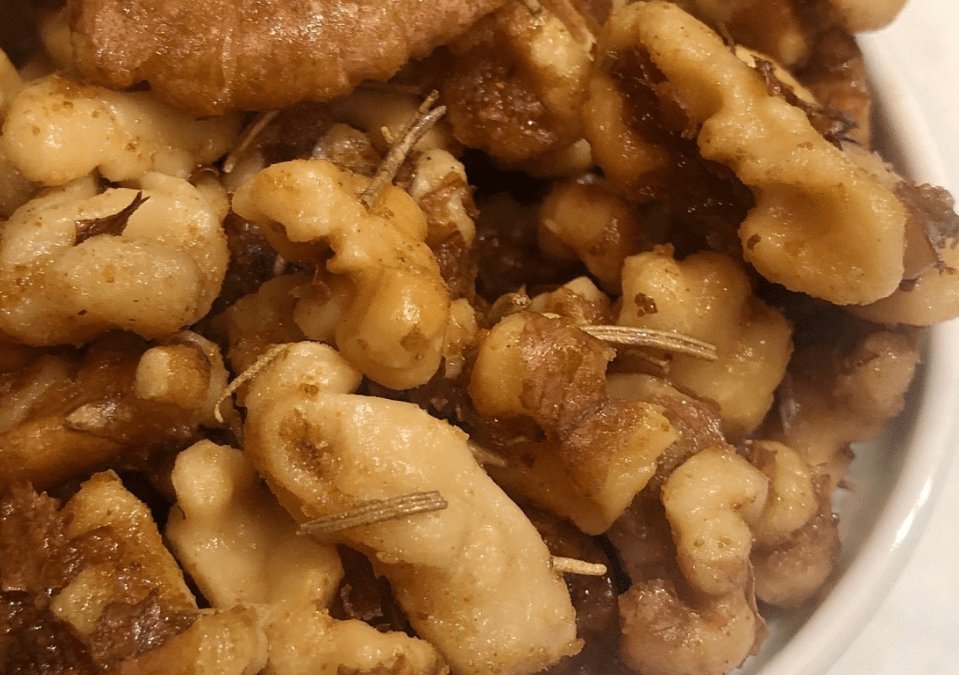
by Julie Pace, RDN | Feb 21, 2022
If you’re looking for a quick, healthy snack that feels indulgent, this Rosemary Walnuts Recipe is perfect for you! The warm, earthy aroma of toasted walnuts paired with fragrant rosemary will make you feel like you’ve just stepped into a luxury spa.
Not only is this snack delicious, but it’s also incredibly nutritious. Walnuts are rich in omega-3 fatty acids, making them a powerful anti-inflammatory food that supports brain and heart health. With just 5 simple ingredients and 10 minutes, you can whip up this savory snack anytime you need a boost of flavor and energy.
Why You’ll Love This Recipe
- Quick and Easy: Ready in just 10 minutes with minimal prep time.
- Healthy and Nutritious: Walnuts provide anti-inflammatory benefits, healthy fats, and essential nutrients.
- Flavorful and Aromatic: Fragrant rosemary, a touch of spice from cayenne pepper, and a hint of salt elevate this snack.
- Vegan and Dairy-Free: Made with plant-based butter for a healthier, versatile option.
- Perfect for Any Occasion: Great for snacking, holiday platters, or as a crunchy topping for salads and soups.
Ingredient Highlights
- Walnuts: Packed with omega-3s, antioxidants, and healthy fats to support heart and brain health.
- Rosemary: Adds an aromatic, earthy flavor and has natural anti-inflammatory properties.
- Cayenne Pepper: Provides a subtle heat to balance the richness of the walnuts.
- Plant-Based Butter: Keeps this snack vegan while enhancing the toasty, buttery flavor.
- Salt: A pinch to bring out the natural flavors of the walnuts and rosemary.
How to Make Rosemary Walnuts
- Preheat the Oven: Set your oven to 350°F (175°C).
- Prepare the Butter Mixture: Melt the plant-based butter in a small bowl. Stir in the rosemary, salt, and cayenne pepper until well combined.
- Coat the Walnuts: Place the walnut halves or pieces in a mixing bowl. Pour the butter mixture over the walnuts and toss to evenly coat them.
- Bake: Spread the walnuts in a single layer on a cookie sheet. Bake for 5–8 minutes, or until the walnuts are toasted and fragrant.
- Cool and Enjoy: Allow the walnuts to cool slightly before enjoying. Serve as a snack, or add them to salads, grain bowls, or cheese platters!
Tips for Perfect Rosemary Walnuts
- Watch Closely: Walnuts can burn quickly, so keep a close eye on them while baking.
- Adjust the Spice: For a milder flavor, reduce or omit the cayenne pepper. Prefer more heat? Add a little extra!
- Storage: Store the cooled walnuts in an airtight container at room temperature for up to a week.
- Double the Batch: These walnuts are so delicious, you might want to make extra for sharing (or snacking later).
Health Benefits of Walnuts
Walnuts are not only delicious but also packed with health benefits:
- Anti-Inflammatory Properties: Omega-3 fatty acids and antioxidants help reduce inflammation in the body.
- Brain Health: Walnuts are rich in nutrients that support cognitive function and brain health.
- Heart Health: Their healthy fats can lower bad cholesterol levels and improve heart health.
FAQs About Rosemary Walnuts
1. Can I use fresh rosemary instead of dried?
Yes! Fresh rosemary works beautifully in this recipe. Use about 1 tablespoon of finely chopped fresh rosemary in place of dried.
2. Can I make these walnuts oil-free?
Absolutely. You can skip the plant-based butter and simply toss the walnuts with the rosemary, salt, and cayenne before baking.
3. How can I use rosemary walnuts?
These walnuts are perfect as a snack on their own, a topping for salads or roasted veggies, or a crunchy addition to charcuterie boards.
Easy Rosemary Walnuts Recipe
This Rosemary Walnut recipe is one of my favorite healthy snack recipes. This recipe only needs 5 simple ingredients and is ready in under 10 minutes. Walnuts are a powerful anti-inflammatory and can provide you with many health benefits.
Prep Time 5 minutes mins
Cook Time 8 minutes mins
Total Time 12 minutes mins
Course Snack
Cuisine American, dairy free, vegan
- 1 Tbsp plant-based butter
- 1 tsp dried Rosemary leaves
- 1/4 tsp salt
- 1/8 tsp cayenne pepper
- 1 cup walnuts halves or pieces
Preheat oven to 350 degrees.
Melt butter in a small bowl. add in rosemary, salt, cayenne pepper. Mix well, then pour over walnuts. Toss well. Bake on cookie sheet for about 5-8minutes or until fragrant. Enjoy!
Keyword healthy snack recipe, nuts, toasted walnut recipe
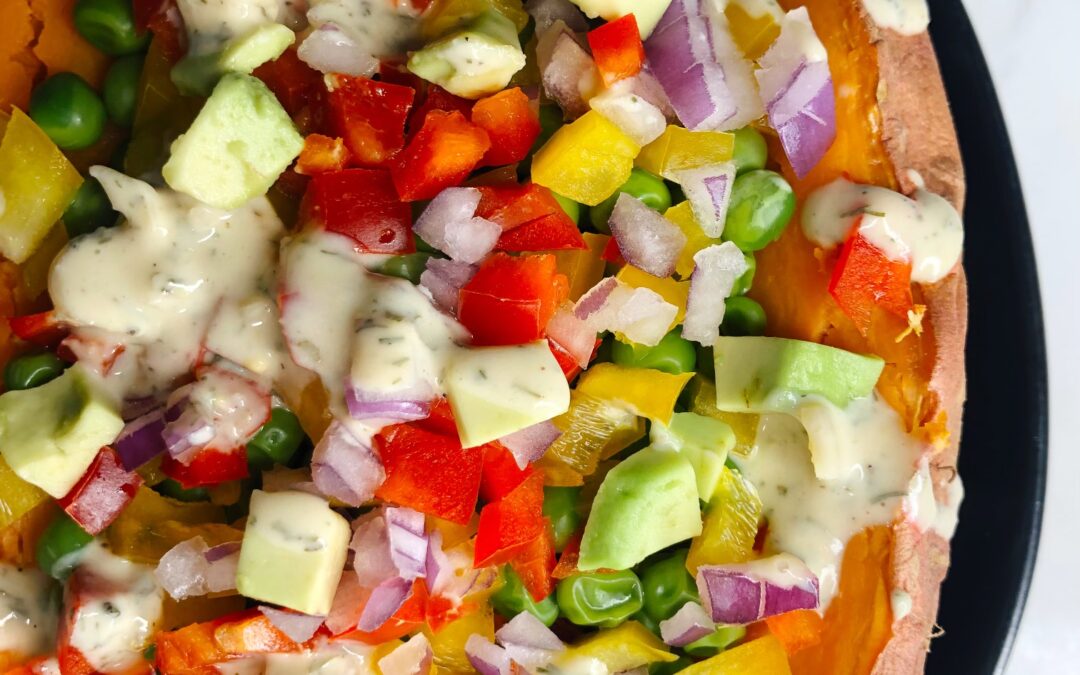
by Julie Pace, RDN | Feb 13, 2022
Loaded Sweet Potato with Lemon Tahini Dressing
This Loaded Sweet Potato drizzled with Lemon Tahini dressing is packed full healthy nutrients, fiber, protein and antioxidants. It’s so good! All you'll need is a baked sweet potato and some colorful produce like bell peppers, onions, garlic, sweet peas and avocados. The sweet peas in this recipe are a great source of protein and fiber. This delicious dish is wholesome, filling and super nutritious.
Prep Time 10 minutes mins
Cook Time 30 minutes mins
Total Time 40 minutes mins
Course Dinner, Lunch, Side Dish
Cuisine American, Mediterranean
- 1 medium sweet potato baked
- 1 medium red bell pepper diced
- 1 medium yellow bell pepper diced
- 1 medium red onion diced
- 1 medium avocado diced
- 1 cup sweet peas cooked
- 3 cloves fresh garlic finely diced
Lemon Tahini Dressing
- 1 Tbsp Tahini
- 1 Tbsp Lemon Juice
- 2 Tbsp Maple Syrup
- 2 tsp dijion mustard
Preheat oven to 400 degrees. Place sweet potato on lined baking sheet and bake for 20-40 minutes or until done.
Top baked sweet potato with diced veggies and drizzle with lemon tahini dressing and enjoy!
Keyword healthy side dish, sweet potato
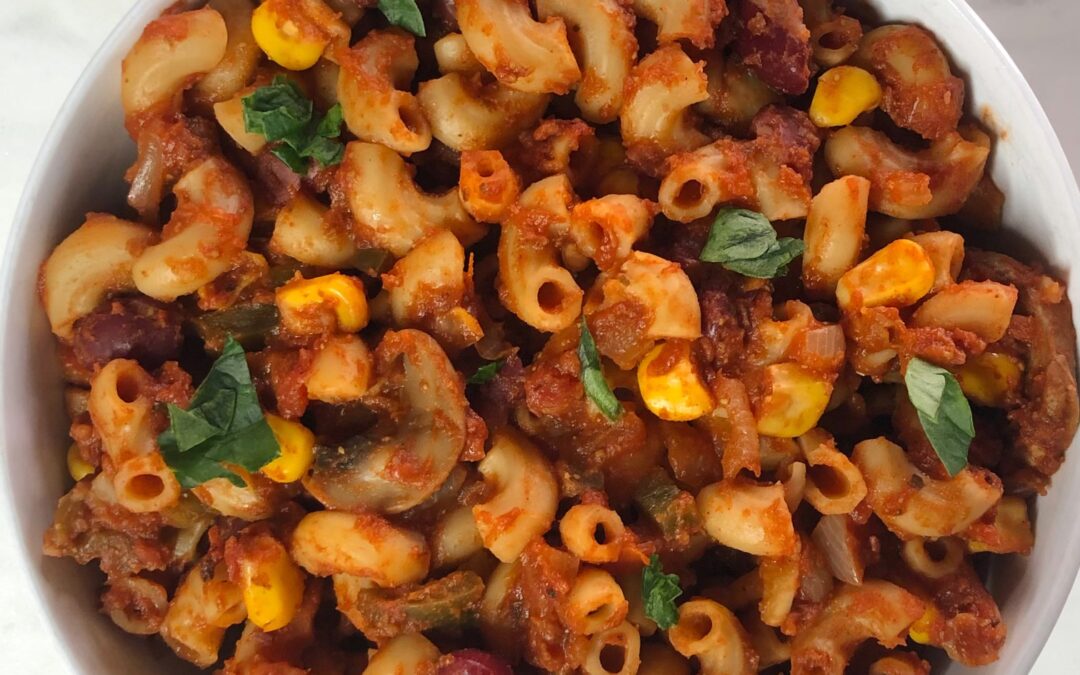
by Julie Pace, RDN | Feb 13, 2022
One Pot Chili Mac
This one pot Vegan Chili Mac is so delicious and makes a perfect meal during cold winter months. It’s packed with flavor, protein, fiber, and other anti-inflammatory & immune supporting ingredients. It's so easy to make and is ready to eat in 30 minutes or less.
Prep Time 5 minutes mins
Cook Time 20 minutes mins
Total Time 25 minutes mins
Course Dinner, Lunch
Cuisine American, Mexican
- 1/3 cup water
- 1 medium sweet onion diced
- 6 garlic cloves chopped
- 8 ounces of white button mushrooms
- 2 BPA-free cans red kidney beans drained and rinsed
- 1 Tbsp chili powder
- 1 tsp smoked paprika
- 1 tsp oregano
- 1 Tbsp cumin
- 1/2 tsp cayenne pepper
- 1-1/2 tsp salt
- 4 cups vegetable broth
- 28 ounce (1 can) fire roasted crushed or diced tomatoes
- 1 can sweet corn 14 ounces, drained
- 8 ounces elbow pasta
- 1 Tbsp bourbon maple syrup or brown sugar
- Optional toppings:
- Cilantro
- Vegan cheddar cheese
In a large pot or Dutch oven, bring water to a simmer over medium heat. Sauté onions, garlic, mushrooms for 3-5 minutes. Add chili powder, smoked paprika, oregano, cumin, cayenne pepper and salt. Stir until combined.
Pour in the vegetable broth and stir until well combined with seasoning and vegetables.
Add beans, tomatoes, corn and pasta to pot and mix well . Bring to a boil then reduce heat to a simmer for 15-20 minutes or until pasta is done.
Season to taste with salt and pepper. Stir in brown sugar or maple syrup.
Optional- Top with vegan cheese and /or freshly chopped cilantro.
Keyword dairy free, healthy pasta recipe, Vegan Recipe

by Julie Pace, RDN | Feb 13, 2022
Buffalo Chickpea and Cauliflower Pizza
This delicious vegan pizza drizzled with homemade ranch dressing is so delicious and is topped with ingredients that provides you with fiber, protein, antioxidants, pre and probiotics and healthy fats. Keep it simple and save time by using a flat bread for the crust.
Course Dinner, Lunch
Cuisine American
- 1 flat bread
- 1 small head of organic cauliflower cut in florets
- 1 can organic chickpeas rinsed and drained
- 2 Tbsp avocado oil
- 1/4 tsp salt
- 2 Tbsp vegan butter
- 1/2 cup Buffalo sauce
- 1 small avocado sliced
- 1 small red onion chopped
- 2 cloves garlic finely diced
Homemade Vegan Ranch Dressing
- 3/4 cup plain vegan yogurt
- 3 tbsp non-dairy milk
- 1 tbsp fresh or dried parsley
- 1 tbsp fresh or freeze dried dill
- 1/2 tsp salt
- 1/4 tsp black pepper
- 1/2 tsp onion powder
- 1/2 tsp garlic powder
- 3/4 tsp maple syrup
Method for pizza:
Preheat oven to 400 degrees.
In a medium bowl, toss cauliflower florets and chickpeas in avocado oil, salt and cornstarch mixture.
Spread evenly on lined baking sheet and bake for 20 minutes. In the last 5 minutes of baking heat pizza crust (or heat according to specific packaging)
In a small saucepan, heat vegan butter and buffalo sauce. Pour over chickpeas and cauliflower.
Remove pizza crust from oven. Spread with chickpeas and cauliflower over crust. Top with avocado, red onion, garlic, spinach, and vegan ranch dressing. Enjoy!
Homemade Vegan Ranch Dressing
Keyword cauliflower, chickpea, Healthy Vegan Recipe, pizza
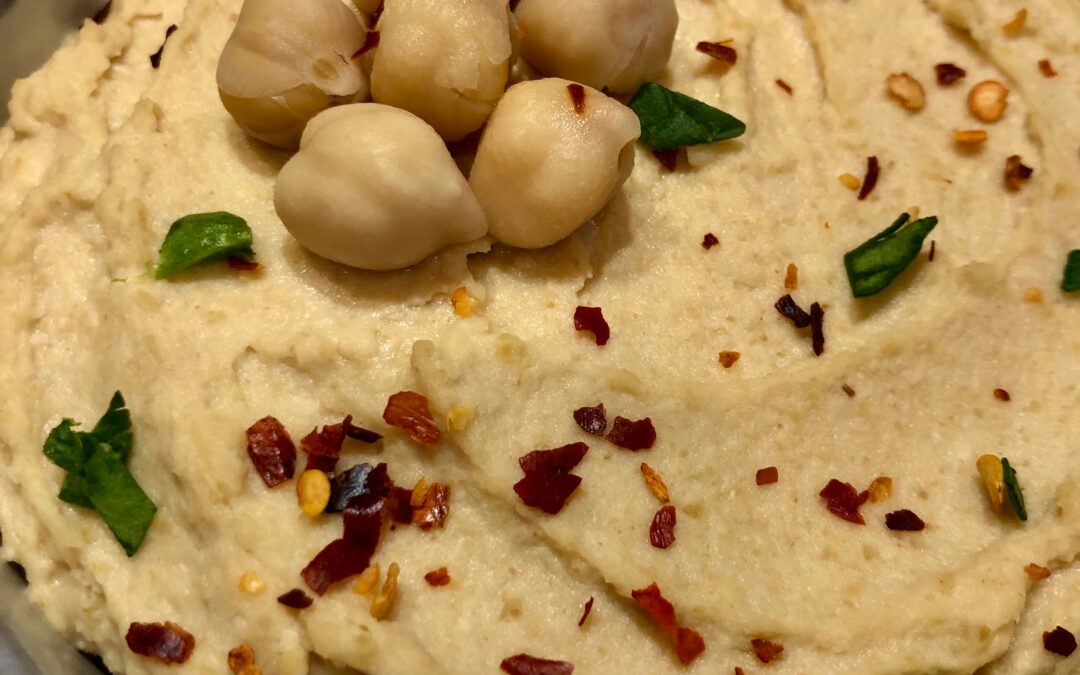
by Julie Pace, RDN | Feb 13, 2022
Healthy Hummus (Easy and Delicious)
This better than store bought hummus recipe is so easy to make and requires just a few simple ingredients. It's made with chickpeas, tahini, lemon and spices. You can use this recipe as an appetizer, snack or use it to add extra protein and fiber to your sandwiches or wraps.
Prep Time 5 minutes mins
Total Time 10 minutes mins
Course Appetizer, healthy snack
Cuisine Mediterranean
- 1 can chickpeas drained and rinsed
- 1/2 tsp baking soda
- 2 Tbsp lemon juice
- 4 cloves garlic finely chopped
- 1/2 tsp salt
- 2/3 cup tahini
- 3/4 tsp ground cumin
- 1 Tbsp extra virgin olive oil optional
Add chickpeas and baking soda in medium pot and cover with 1-2 inches of water. Bring to a boil, reduce heat to low-simmer until skin start falling off chickpeas. About 15 minutes.
Drain and rinse chickpeas in cold water. Transfer chickpeas to a food processor or blender. Add garlic, lemon juice, tahini, cumin, salt, and EVOO (if desired). Process until smooth and creamy, stopping and scraping down sides of bowl, if needed. Add more salt to taste, if needed.
*If mixture is too thick, add 1-2 Tbsp cold water. Blend until smooth.
Transfer to bowl and sprinkle with red pepper flakes. Enjoy!

